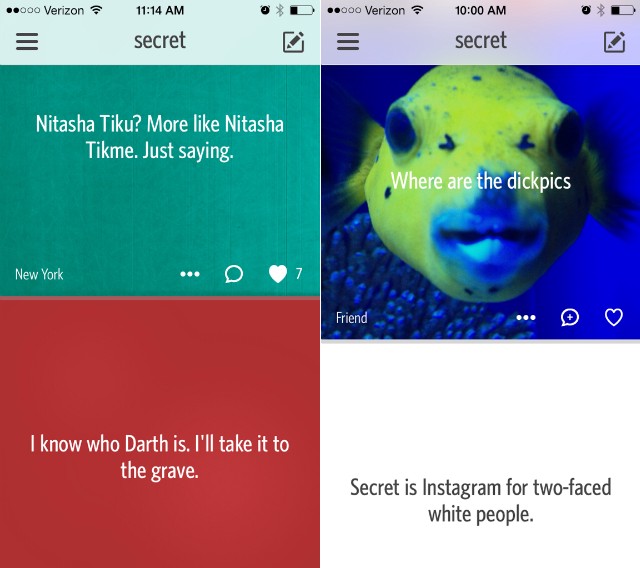Hot New App Already Filled With Garbage

Do you remember PostSecret, that project where people mailed anonymous postcards with secrets written on them to be published in books and museum installations and websites and things like that? Well, San Francisco remembers, because there have been two high-profile app versions in the past few weeks: Whisper and now Secret.
Secret, which is impossible to find by searching for it in the App Store on your iPhone (try searching for “secret” and you’ll come up with, like, “My Secret Diary” and “Best Windows 7 Secrets.” If you want to download it, go to secret.ly on your phone browser. Good start to your relationship with this app), has raised $1.4 million in funding from Google Ventures and other malcontents like Alexis Ohanian, the founder of Reddit. Let’s not think about what that means for, like, the global economy and your own worth as a human. Instead let’s talk about this weird app!
Secret begins by asking you for MUCH MORE INFORMATION than you’re comfortable giving. It needs your email address, it needs access to your contacts, okay, that’s relatively normal, at least normal in a way that would have felt egregiously invasive ten years ago and will feel portentous in another ten years when we’re all living in a Mad Max desert because the apps have ruined the planet, but normal enough. Then the app asks for your phone number, which it wants to even further connect you with people, and possibly to sell to telemarketers, who knows. I have never seen this before. How scary, I thought. How weird, I thought. I can’t imagine that this is really necessary, I thought. This seems problematic, I thought. Anyway, I gave it my phone number.
Now that you’ve given away all your personal information, you can scroll through a series of short, text-based “secrets,” on a white or colored background or, sometimes, a photo, which you choose from your own photos. You don’t choose a username. You can “like” or comment on each secret, and the comments section of each secret is populated by anonymous commenters, each given a random icon as their avatar.
The difference about Secret is that these secrets are from people you know, or people they know, or people those people know. Secrets are typically, at most, two or three degrees of separation away from someone in your phone’s contacts. This is supposed to be alluring; it’s an odd combination of privacy and intimacy, given that nobody knows who anybody else is, but is pretty sure they would know who the other people are. Whisper, a similar app, shows secrets from around the world, though you can filter by proximity to you. That makes Whisper much weirder; there’s much more data coming at you from all over the world, which means the app mutates and finds its natural niche faster and in interesting ways (who knew it would be used as a hookup app? Example here). Whisper also automatically attempts to find an image to match your secret, and does a terrible/great job of it, which adds another level of internet randomness on top. Secret, in contrast, is much cleaner, more streamlined, better designed (whatever that means), and not nearly as interesting.
The problem is that it relies on the creativity of your friends rather than the swarming mass of humanity. My experience of Secret, unfortunately, is full of tech bloggers making tech jokes on a tech app. And also, thankfully, a whole bunch of trolls making fun of each other (or, really, making fun of Sam Biddle).
So why does this thing exist? Secret is just one more app pursuing the reactive goal of the ephemeral internet, which its creators write about at length (on Medium, ha):
As social networking has become universal, we’ve become increasingly sensitive to what we share online. Speaking on a stage in front of a mixed audience of family, friends, and acquaintances makes it hard for us to be our most authentic selves. As a result, we tend to share only our proudest moments in an attempt to portray our best selves. We filter too much, and with that, lose real human connection. We built Secret for people to be themselves and share anything they’re thinking and feeling with their friends without judgment.
The idea is, our online personas are no longer frivolous and fun. Post an Instagram and it’ll be there for your kids when they Bing you on their FutureZunes in the year 2040. Employers, according to various trend-pieces, screen applicants by browsing their Facebook, Twitter, and Instagram. Scary! So this has birthed the ephemeral internet, led by Snapchat. The goal is to bring back that carefree anonymous joy of not giving a shit about what you do online, whether because it disappears or because nobody knew where it came from in the first place.
Which makes Secret all the more odd! Because it’s a hybrid: it’s incredibly invasive when making your network, but then anonymous during actual use. It’s a tease: anonymous, but it only shows secrets from people you might know in real life. And when you’re making an app that takes a stand against the status quo (lol, like any of this is serious at all), I’m not sure it makes sense to have a hybrid or a tease; it feels like too much of a compromise. But who knows, I thought Twitter was pretty stupid at first too.
Another good app is this game called Mr. Crab. It’s about a crab that jumps. I like it more than Secret.
